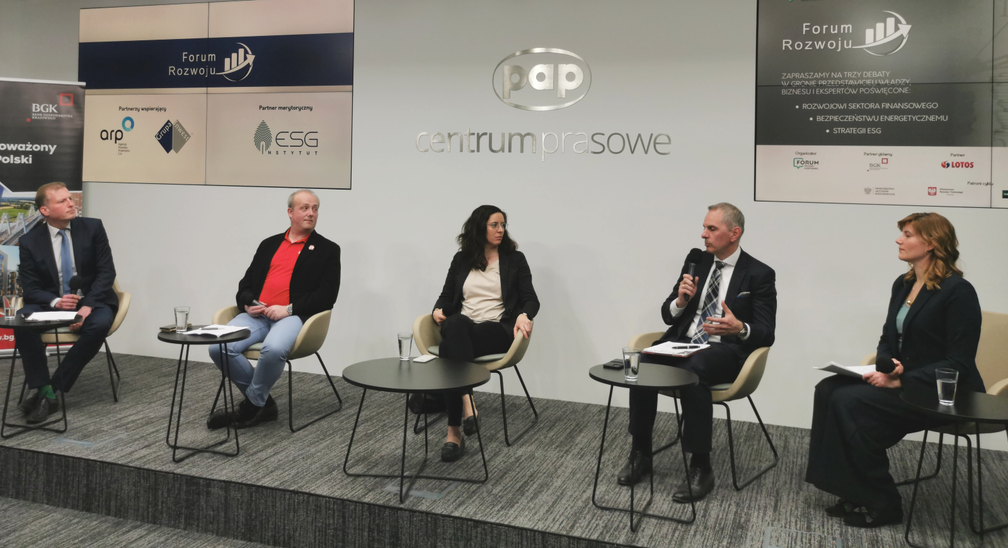Planning and Reporting on Sustainable Development. ESG Conference

As of 2024, all large companies and large capital groups and public companies will be required to report on actions for sustainable development (ESG). In connection with this, the ESG Institute organized a debate entitled “ESG – How to Plan and Report Sustainable Development” in which CFO Motivizer Piotr Dubno participated. The meeting took place as part of the Development Forum, organized by the Forum of the Polish Economy.
Obligation to report on sustainable development actions
The debate was moderated by Damian Kurasi, director of the ESG Institute and vice president of the XBW Ignacy Krasicki Foundation. Participants include:
- Maria Ibisz, senior manager in the sustainable development team at Deloitte Central Europe
- Agnieszka Skorupińska, lawyer, partner and leader of the environmental law team at CMS law firm
- Piotr Dubno, member of the board of Motivizer
- Przemysław Śmiałkowski, advisor to the National Committee of Special Olympics Poland.
ESG is a process that has sparked a revolution
As of 2024, large companies (employing over 250 people) and large capital groups will have to report their actions for sustainable development for 2023. Small and medium-sized enterprises will have an additional 3 years to prepare, as the obligation to report non-financial factors will apply to them from 2026. This means that Polish entrepreneurs have little time to prepare for this process.
Standardization of annual reporting is being carried out. This is a revolution in terms of transparency
– said Maria Ibisz, senior manager Deloitte Central Europe.
The result of these regulations will be the creation of a business that is more resilient to climate change and consciously managed, and a change in capital allocation is also expected, so that banks and financial institutions can support investments that are green, have lower risk and contribute to sustainable development.

What is ESG?
It is an acronym for Environmental, Social and Corporate Governance, it is a new standard for reporting information about companies and their impact on the environment.
Przemysław Śmiałkowski, advisor to the National Committee of Special Olympics Poland, said that ESG actions include, among other things, improving the efficiency of employees when they see that their work contributes to improving the environment. When a company operates on clear messages that stakeholders can identify with, it can be more effective.
The implementation of ESG reporting will take 2 to 5 years
In Poland, about three thousand companies will be subject to new requirements.
– We estimate that 10% of them are in the stage of preparation or implementation of ESG reporting. Real implementation of processes, not just reporting, but also strategies, will take two to five years.
– explained Ibisz.
The speakers agreed that the process, which is referred to as a revolution, is not an unpleasant obligation or unnecessary cost.
Piotr Dubno also pointed out that at the end of this process there are investors, shareholders and other stakeholders who must understand what this change will mean.
– They already know that it is not only a cost, but also that we have to be more efficient, aware and open to challenges that not only bring climate change, but also changes in business models
– said Dubno i and added that the axis of reporting is always the finance department, where people responsible for information for investors most often work.
This process of change cannot be carried out on the principle that companies will freely collect data, which cannot be compared between periods, add colorful graphics and summarize it with an optimistic comment. – This change is permanent, so it must be compatible with other parts of reporting considered more traditional – Dubno explains and gives an example of changes in accounting regulations aimed at unifying, comparability and presentation.
Numbers tell a story in business
During the debate, Piotr pointed out that the changes facing Polish entrepreneurs are a global trend that can no longer be reversed. This is demonstrated by the behavior of global investment funds. Companies in which these funds have a significant stake must prepare a so-called strategic outlook, i.e. what changes in the climate mean for a particular business and how we will report on efficiency and capital allocation.
– The increase in the value of assets managed by these funds over the past five years was almost 550%, from $16 to $87 trillion. On a global scale, this means that these changes are not isolated, but a trend. Numbers are there to tell a story, but that story must be consistent with everything else we are telling the market about how we will be competitive, how we will be better, or how we will make money. And it’s just how deeply climate change will be linked to our strategy that must be consistent with all other information provided to the market,” said our CFO during the debate
The European Union strongly supports sustainable and responsible actions by companies. At the end of February 2022, the European Commission submitted a proposal for the Directive on corporate sustainability due diligence. According to experts, these are only the first stages of the “green transformation” and the first sets of obligations for companies.
„There is no other way for businesses that want to grow and strengthen”
What should a good ESG report look like
One of the more important questions asked during the debate was: what should a good ESG report look like.
–A report must contain specific numerical indicators, be accurate, complete, and address the needs of investors, on one hand. On the other hand, the report must also show how the company creates value, what the organizational culture is like, and what practices and actions are taken. The reports must primarily show the true face of the organization and it is not worth glossing over reality, said Maria Ibisz from Deloitte.
Experts also agreed that, thanks to reporting and taxonomy, understood as a set of regulations at the European level, it will be easier for investors to make financial decisions, assess risk, and conditions. According to experts, if we rely on research results among companies that report in an integrated manner, 85% of them indicate that reporting improved decision-making processes and strategic planning for the future.
Więcej o konferencji “ESG – czyli jak planować i raportować zrównoważony rozwój” można przeczytać w artykule Gazety Prawnej
Recent Posts:
- Capital24.tv Debate with Piotr Dubno – “Economy, Innovation, Investments. What Changes Await Us?
- The future of HR – what will be the key to organizational success?
- Are you keeping up with the idea of a modern workplace?
- Burnout, how can an employer help an employee?
- Digitalization of HR is key to unlocking the full potential of an organization

